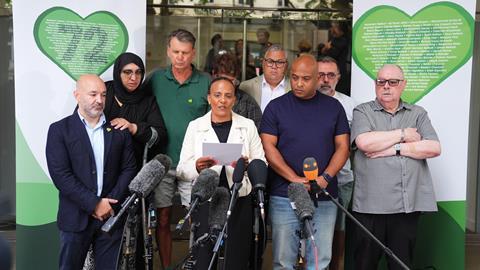Despite this week’s publication of the final report of the Grenfell Tower Inquiry, survivors and the bereaved still face an agonising wait before those truly responsible are held to account
Pictured above: Grenfell survivor Natasha Elcock speaking after the publication of the final report of the Grenfell Tower Inquiry
A public inquiry into the fire at Grenfell Tower in June 2017 that killed 72 people published its final report this week. The report was both forensic and scathing, but attention quickly shifted from its devastating conclusions to the years of further heartache survivors and the bereaved will have to suffer before justice is served. It would seem that a decade or more will have elapsed before that happens, if it happens at all. Once again, British justice is in the dock.
The inquiry, led by retired Court of Appeal judge Sir Martin Moore-Bick, was established two months after the tragedy. Its investigation was conducted in two phases. Phase 1 concerned events on the day and the inquiry published a report in October 2019. Wednesday’s report concerned phase 2 – the underlying causes of the fire with a view to identifying where mistakes were made and ensuring a similar disaster cannot occur again.
The inquiry concluded that the fire ‘was the culmination of decades of failure by central government and other bodies in positions of responsibility in the construction industry to look carefully into the danger of incorporating combustible materials into the external walls of high-rise residential buildings and to act on the information available to them’.
Moore-Bick said: ‘The simple truth is that the deaths that occurred were all avoidable and that those who lived in the tower were badly failed over a number of years and in a number of different ways by those who were responsible for ensuring the safety of the building and its occupants.’
Not all of them bear the same degree of responsibility, Moore-Bick noted. ‘But, as our reports show, all contributed to it in one way or another, in most cases through incompetence but in some cases through dishonesty and greed.’
So what now?
Graham French, a consultant at Russell-Cooke, was legal adviser to a group of the bereaved, survivors and residents. He said: ‘The victims of the disaster whom we represent wish to see justice in the form of criminal prosecutions of those who deliberately cheated the regulatory system, knowing they were risking lives, motivated by profit. We will be actively pursuing the issue of prosecutions and liaising with the police and Crown Prosecution Service on our clients’ behalf.’
Grenfell United, a group of survivors and bereaved families, said: ‘We have an expectation that the Met Police and the CPS ensure that those who are truly responsible are held to account and brought to justice.’
Met Police deputy assistant commissioner Stuart Cundy said the phase 2 report was ‘direct, comprehensive and reaches clear conclusions’. However, he added: ‘Our investigation is independent of the public inquiry. It operates under a different legal framework and so we cannot simply use the report’s findings as evidence to bring charges. To secure justice for those [affected], we must examine the report – line by line – alongside the evidence from the criminal investigation.’
That process will take at least 12-18 months.
Cundy said: ‘I can’t pretend to imagine the impact of such a long police investigation on the bereaved and survivors, but we have one chance to get our investigation right. We will be thorough and diligent in our investigation while moving as swiftly as possible.’
Frank Ferguson, head of the CPS special crime and counter terrorism division, said the prosecuting body does not expect to be in a position to make any charging decisions until the end of 2026.
The inquiry’s report contained several recommendations. These include the establishment of a construction regulator responsible to a single secretary of state, an urgent review of the definition of a higher-risk building for the purposes of the Building Safety Act, and a legal duty on the government to maintain a publicly accessible record of recommendations made by select committees, coroners and public inquiries, with a description of the steps taken in response.
Grenfell United urged the government to implement all of the recommendations ‘without further delay’.
Prime minister Sir Keir Starmer told the Commons on Wednesday the government will respond in full to the inquiry’s recommendations within six months, but signalled swifter action on addressing the remaining buildings with unsafe cladding.
Moore-Bick closed his public statement on Wednesday with a reminder that the fire ‘was and remains an intensely personal tragedy for all those who lived in and around the tower and above all for those who died, their families and friends’, before reading out the names of the 72 people who died.
The pain, and the fight for justice, endures.
This article is now closed for comment.





































1 Reader's comment